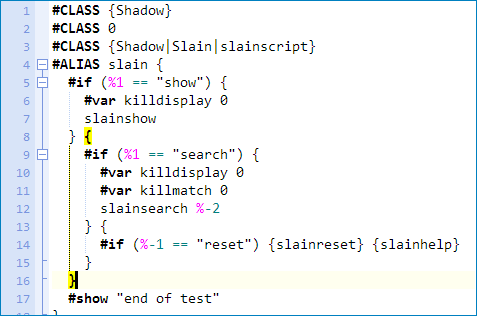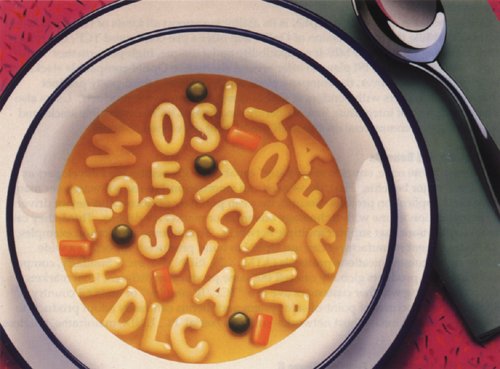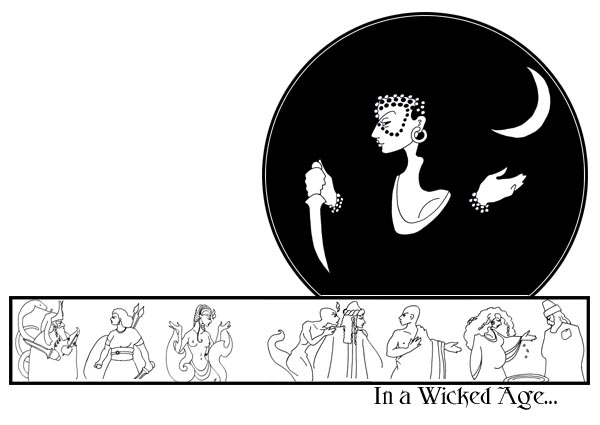The middle day of Carnage has three slots, but we still ended up playing only two games. That's because the middle slot was the one I was supposed to spend
GMing my adventure set in the world of Joss Whedon's
Firefly. I'd listed the game as needing 3-6 players, because you can't really crew a ship with less than 3 (even 3 is pushing it), but more than 6 gets too much to handle (and I'd only made 6 pregens). However, when filling out my own registration, I listed myself in that slot in the game -- because of course that's what I would be doing in that slot -- and the con organizers thus listed me as a player and took up one of the six slots, perhaps assuming I'd done that intentionally. Siobhan has already played this adventure so we only made it her second choice, which was a mistake -- she didn't want to play either way -- and since she got bumped from her first choice, she ended up taking another one of the slots. The other four filled up, but of them, one was a no-show and another one got up and left in the first couple of minutes because he'd been asked at the last minute to take over GMing something else, leaving us with only two.
Could we have had a full house, or at least enough to play? Probably, if the con organizers hadn't blocked off one slot with me, if we hadn't left Siobhan with it as her second choice, if she hadn't been bumped, and most tellingly, if the con embraced some kind of registration system that was less manual and allowed us to see the results of registration before the day of the con. I wonder how may potential players got turned away because "it's full" and if this might have, at last, been a chance to actually pull off a game. Oh well, we'll never know.

The morning slot was supposed to be Tyler's GURPS Ghostbusters game, a sequel to the game we played in last year, but I was bumped from it, and Siobhan was ready to play but we never saw Tyler and we never found out what was going on. Fortunately she was able to slip into Charlton's game of
Last Train Out Of Warsaw.
This had been my second choice for two reasons. First, while I love Charlton's storytelling games, I thought it a good idea to pick something other than a diet of 100% Charlton, and Tyler's game was fun last year and it seemed like a good place to veer back to more familiar styles of roleplaying. Second, this game was set in World War Two, which is a period of history in which I have little knowledge and not a lot of interest.
In 1944, as the Germans conquered Warsaw, a single train is getting out just before the end, loaded up with far too many passengers eager to escape to Romania, and secretly, almost 9000 five-pound ingots of gold, essentially the whole treasury of Poland being brought to safety both to prevent the Nazis from getting it and to ensure a hope for the rebuilding of Poland. We played selected crew and passengers on this train, each with our own secrets and agendas (many of which we were making up as we went).
The game never flagged, and while there were a few moments where my unfamiliarity with the period or that part of the world made me feel a little out of my depth, they were small, brief, and quickly gotten past. The game includes a mechanic where you can interrupt a scene someone else is narrating with any of a number of phrases to throw extra complications or considerations into it, and I never quite got into the habit of using the phrases, though I think I can safely say that I did throw some of the things into the game the phrases were meant to accomplish, I just didn't do it in the structure the game provides. I think I could have done more, and would have, if I played the game again (and thus felt more comfortable with it), were better rested, or it were a more comfortable setting.
I'm particularly pleased with how my character's story resolved. He was the conductor, and struggled to be a voice of order and a calming force on the panicking passengers, coming time and again to the idea that if we all just buck up and sit quietly, this will all work out. He played a lot on the meager authority that his crisply pressed uniform gave him. But he was also, for reasons unknown, working as an informant for the Soviets. I kept despairing of chances to develop this or have it even come up in play, and when, right near the end of the game, the train blew right through the city in which his handler could be found without stopping, I thought I would have no chance to resolve his story at all.
Then we got stopped by some Russian soldiers who'd set up a small camp and a machine gun emplacement that was more than adequate to stopping the train. Having learned of the secret gold long before, the conductor made sure he was the one to talk to the Russians and, rather than keeping it secret, spilled it all eagerly, revealing that he was serving as an informant to ensure the safety of his family (who had, I never quite got to say, been spirited to somewhere safe in exchange for his spying). Having thus discharged his duty, standing in the office of the ranking Russian officer and hearing the train beginning to start up without him (apparently hoping against hope to try their luck with the machine gun, to avoid having the gold found), he grabbed the officer's revolver and unloaded it into the machine gun nest, killing the soldier manning it and allowing the train its escape. He then threw the gun down, saying, "as long as my family is safe" while clutching his wife's locket, and waited to be mowed down by the Russians in whose camp he'd been left behind as he betrayed them. It was a perfect ending to his story and fulfilled the provided resolution that he would, in the end, rise above his flaws and become a hero.

The evening slot was another Charlton session with another storytelling game,
Don't Rest Your Head, a surrealistic game in which extended insomnia causes hallucinations that become, apparently, the real truth over which what we thought to be reality was just a paper-thin illusion. The premise put me slightly in mind of
Solipsist, but I went in not necessarily expecting play to be anything like Solipsist, which I had found
not quite ready to play. There are some things similar, but none of those that caused me difficulties with Solipsist; how much of that comes from the GM being comfortable with the system, versus from the system itself and its setting, I can't guess.
Beforehand I sat down to make a few sentences of notes about a character idea who had a reason to be insomniac, and that turned into a whole page. Almost everything on that page came out during play, which is surprising, since only a few bits came out on my character sheet. My character had lost her parents in a car crash, her father to a long painful death, her mother to crippling injuries and a dissociative disorder, and then lost her husband to the effort required to care for her mother, and was doing 24-hour care alone and with no support and barely any money. What started her on her adventure was her father visiting to tell her that her mother was still alive and simply being held, and if she could be gotten back, all would be well.
With seven other players with similarly odd starting points, it took a long time and a lot of use of the coincidence-crowbar to get us working together and to tie several of the stories into one whole. Several of the characters didn't get much resolution to their storylines, but everyone got to participate. In the end, we had a lawyer draw up a contract with the soon-to-become King of the Cats by which my character's mother agreed to become his Queen, and also to give up the thumbs of her body she'd no longer be using, as long as she'd be able to (in cat form) visit her family. This also got another character his dog (and thumbs) back, and fulfilled the lawyer's ambition to do something important (and thus justify her own decisions). Along the way, we robbed a Walmart, drove to Seattle by folding space, got attacked by clockwork automata auditors, watched ER nurses and investment bankers drain the lives out of hapless victims, burned down an apartment building that ate its inhabitants, and discovered the hidden history (not that well hidden, there's a whole wing about it in the Seattle Aviation Museum) of how demonology is the secret of making jet engines work. (But we stopped short of getting the demons unionized so they could demand better terms for their work carrying airplanes around.)
In some ways we only glanced on the game because that many people in that short a time made everyone have to share their spotlight time a lot. I never used most of the mechanics and most of my character sheet, for instance. But what we did use certainly helped facilitate a delightfully surreal, funny, occasionally creepy, and highly imaginative game.
 It's not like I've never had cats, even young cats, around a Christmas tree before. Until Brynna died a year and a half ago, there've been cats in my house pretty much every day of my life, so that includes every day with a Christmas tree. We've long since had a policy of lining the bottom of the tree with the unbreakable ornaments, and the ones we wouldn't mind losing, while saving the more important ones for higher up.
It's not like I've never had cats, even young cats, around a Christmas tree before. Until Brynna died a year and a half ago, there've been cats in my house pretty much every day of my life, so that includes every day with a Christmas tree. We've long since had a policy of lining the bottom of the tree with the unbreakable ornaments, and the ones we wouldn't mind losing, while saving the more important ones for higher up.

























 RealTime and RTC
RealTime and RTC Prism
Prism Uncreated
Uncreated Bloodweavers
Bloodweavers Foulspawner's Legacy
Foulspawner's Legacy Lusternia
Lusternia